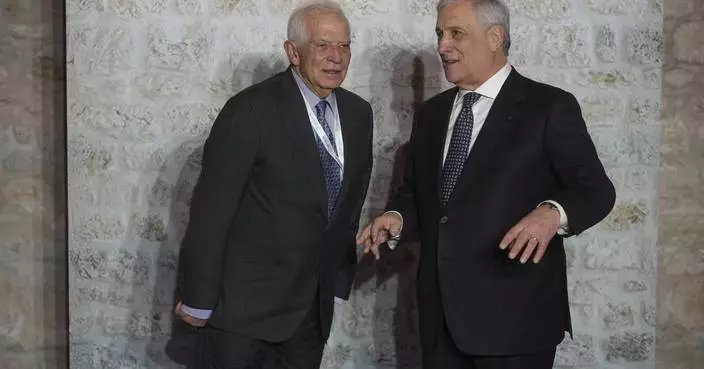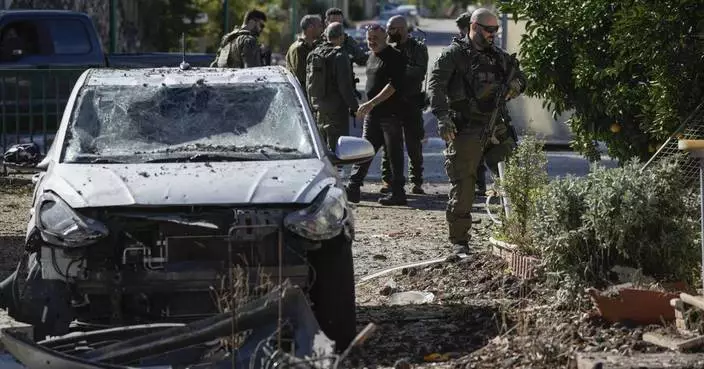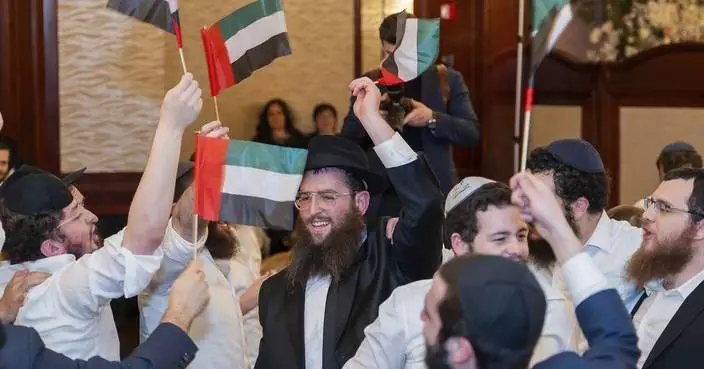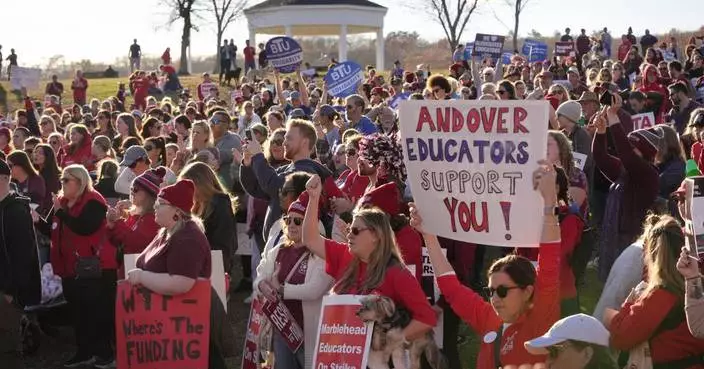LAHAINA, Hawaii (AP) — Andrej Jakimovski converted an off-balance layup with 8 seconds left, and Colorado handed No. 2 UConn its second loss in two days at the Maui Invitational, beating the two-time defending national champion 73-72 on Tuesday.
A day after a 99-97 overtime loss to Memphis that left Huskies coach Dan Hurley livid about the officiating, UConn (4-2) couldn't shake the unranked Buffaloes (5-1), who shot 62.5% in the second half.
Click to Gallery
UConn forward Jaylin Stewart, center, grabs the loose ball against Colorado during the second half of an NCAA college basketball game at the Maui Invitational Tuesday, Nov. 26, 2024, in Lahaina, Hawaii. Colorado won 73-72. (AP Photo/Lindsey Wasson)
UConn guard Hassan Diarra (10) looks around the defense of Colorado guard RJ Smith (5) during the second half of an NCAA college basketball game at the Maui Invitational Tuesday, Nov. 26, 2024, in Lahaina, Hawaii. Colorado won 73-72. (AP Photo/Lindsey Wasson)
Colorado guard RJ Smith (5) reacts after a basket as UConn forward Jayden Ross (23) looks on during the second half of an NCAA college basketball game at the Maui Invitational Tuesday, Nov. 26, 2024, in Lahaina, Hawaii. Colorado won 73-72. (AP Photo/Lindsey Wasson)
Colorado forward Trevor Baskin calls for a timeout as UConn forward Liam McNeeley stands over him while trying to grab the ball during the second half of an NCAA college basketball game at the Maui Invitational Tuesday, Nov. 26, 2024, in Lahaina, Hawaii. Colorado won 73-72. (AP Photo/Lindsey Wasson)
UConn guard Solo Ball reacts after a basket against Colorado during the second half of an NCAA college basketball game at the Maui Invitational Tuesday, Nov. 26, 2024, in Lahaina, Hawaii. Colorado won 73-72. (AP Photo/Lindsey Wasson)
Colorado forward Andrej Jakimovski sits up while being greeted by the bench after falling while making a basket against UConn during the second half of an NCAA college basketball game at the Maui Invitational Tuesday, Nov. 26, 2024, in Lahaina, Hawaii. Colorado won 73-72. (AP Photo/Lindsey Wasson)
With Colorado trailing 72-71 in the closing seconds, Jakimovski drove to his right and absorbed contact from UConn’s Liam McNeeley. He tossed the ball toward the glass and the shot was good as he fell to the floor. Hassan Diarra missed a 3-pointer just ahead of the buzzer for UConn.
Elijah Malone and Julian Hammond III scored 16 points each for Colorado, and Jakimovski had 12 points and 10 rebounds.
The Huskies led 40-32 at halftime and by nine points early in the second half, but Colorado quickly closed that gap. McNeeley led UConn with 20 points.
UConn: Hurley's squad is facing its first adversity in quite a while. The Huskies arrived on Maui with a 17-game winning streak that dated to February.
Colorado: The Buffaloes were held to season lows in points (56) and field goal percentage (37%) in a 16-point loss to Michigan State on Monday but shot 51.1% overall and 56.3% (9 of 16) from 3-point range against the Huskies.
Hurley called timeout to set up the Huskies' final possession, but the Buffs forced them to take a contested 3.
Colorado had a 28-26 rebounding advantage after being out-rebounded 42-29 by Michigan State.
Colorado will play the Iowa State-Dayton winner in the fifth-place game on Wednesday. UConn will play the loser of that matchup in the seventh-place game.
Get poll alerts and updates on the AP Top 25 throughout the season. Sign up here. AP college basketball: https://apnews.com/hub/ap-top-25-college-basketball-poll and https://apnews.com/hub/college-basketball.

UConn forward Jaylin Stewart, center, grabs the loose ball against Colorado during the second half of an NCAA college basketball game at the Maui Invitational Tuesday, Nov. 26, 2024, in Lahaina, Hawaii. Colorado won 73-72. (AP Photo/Lindsey Wasson)

UConn guard Hassan Diarra (10) looks around the defense of Colorado guard RJ Smith (5) during the second half of an NCAA college basketball game at the Maui Invitational Tuesday, Nov. 26, 2024, in Lahaina, Hawaii. Colorado won 73-72. (AP Photo/Lindsey Wasson)

Colorado guard RJ Smith (5) reacts after a basket as UConn forward Jayden Ross (23) looks on during the second half of an NCAA college basketball game at the Maui Invitational Tuesday, Nov. 26, 2024, in Lahaina, Hawaii. Colorado won 73-72. (AP Photo/Lindsey Wasson)

Colorado forward Trevor Baskin calls for a timeout as UConn forward Liam McNeeley stands over him while trying to grab the ball during the second half of an NCAA college basketball game at the Maui Invitational Tuesday, Nov. 26, 2024, in Lahaina, Hawaii. Colorado won 73-72. (AP Photo/Lindsey Wasson)

UConn guard Solo Ball reacts after a basket against Colorado during the second half of an NCAA college basketball game at the Maui Invitational Tuesday, Nov. 26, 2024, in Lahaina, Hawaii. Colorado won 73-72. (AP Photo/Lindsey Wasson)

Colorado forward Andrej Jakimovski sits up while being greeted by the bench after falling while making a basket against UConn during the second half of an NCAA college basketball game at the Maui Invitational Tuesday, Nov. 26, 2024, in Lahaina, Hawaii. Colorado won 73-72. (AP Photo/Lindsey Wasson)
BEIRUT (AP) — In 2006, after a bruising monthlong war between Israel and Lebanon’s Hezbollah militant group, the United Nations Security Council unanimously voted for a resolution to end the conflict and pave the way for lasting security along the border.
But while relative calm stood for nearly two decades, Resolution 1701’s terms were never fully enforced.
Now, figuring out how to finally enforce it is key to a U.S.-brokered deal that brought a ceasefire Wednesday.
In late September, after nearly a year of low-level clashes, the conflict between Israel and Hezbollah spiraled into all-out war and an Israeli ground invasion. As Israeli jets pound deep inside Lebanon and Hezbollah fires rockets deeper into northern Israel, U.N. and diplomatic officials again turned to the 2006 resolution in a bid to end the conflict.
Years of deeply divided politics and regionwide geopolitical hostilities have halted substantial progress on its implementation, yet the international community believes Resolution 1701 is still the brightest prospect for long-term stability between Israel and Lebanon.
Almost two decades after the last war between Israel and Hezbollah, the United States led shuttle diplomacy efforts between Lebanon and Israel to agree on a ceasefire proposal that renewed commitment to the resolution, this time with an implementation plan to try to reinvigorate the document.
In 2000, Israel withdrew its forces from most of southern Lebanon along a U.N.-demarcated “Blue Line” that separated the two countries and the Israeli-annexed Golan Heights, which most of the world considers occupied Syrian territory. U.N. peacekeeping forces in Lebanon, known as UNIFIL, increased their presence along the line of withdrawal.
Resolution 1701 was supposed to complete Israel’s withdrawal from southern Lebanon and ensure Hezbollah would move north of the Litani River, keeping the area exclusively under the Lebanese military and U.N. peacekeepers.
Up to 15,000 U.N. peacekeepers would help to maintain calm, return displaced Lebanese and secure the area alongside the Lebanese military.
The goal was long-term security, with land borders eventually demarcated to resolve territorial disputes.
The resolution also reaffirmed previous ones that call for the disarmament of all armed groups in Lebanon — Hezbollah among them.
“It was made for a certain situation and context,” Elias Hanna, a retired Lebanese army general, told The Associated Press. “But as time goes on, the essence of the resolution begins to hollow.”
For years, Lebanon and Israel blamed each other for countless violations along the tense frontier. Israel said Hezbollah’s elite Radwan Force and growing arsenal remained, and accused the group of using a local environmental organization to spy on troops. Lebanon complained about Israeli military jets and naval ships entering Lebanese territory even when there was no active conflict.
“You had a role of the UNIFIL that slowly eroded like any other peacekeeping with time that has no clear mandate,” said Joseph Bahout, the director of the Issam Fares Institute for Public Policy at the American University of Beirut. “They don’t have permission to inspect the area without coordinating with the Lebanese army.”
UNIFIL for years has urged Israel to withdraw from some territory north of the frontier, but to no avail. In the ongoing war, the peacekeeping mission has accused Israel, as well as Hezbollah, of obstructing and harming its forces and infrastructure.
Hezbollah’s power, meanwhile, has grown, both in its arsenal and as a political influence in the Lebanese state.
The Iran-backed group was essential in keeping Syrian President Bashar Assad in power when armed opposition groups tried to topple him, and it supports Iran-backed groups in Iraq and Yemen. It has an estimated 150,000 rockets and missiles, including precision-guided missiles pointed at Israel, and has introduced drones into its arsenal.
Hanna says Hezbollah “is something never seen before as a non-state actor” with political and military influence.
Israel's security Cabinet approved the ceasefire agreement late Tuesday, according to Prime Minister Benjamin Netanyahu's office. The ceasefire began at 4 a.m. local time Wednesday.
Efforts led by the U.S. and France for the ceasefire between Israel and Hezbollah underscored that they still view the resolution as key. For almost a year, Washington has promoted various versions of a deal that would gradually lead to its full implementation.
International mediators hope that by boosting financial support for the Lebanese army — which was not a party in the Israel-Hezbollah war — Lebanon can deploy some 6,000 additional troops south of the Litani River to help enforce the resolution. Under the deal, an international monitoring committee headed by the United States would oversee implementation to ensure that Hezbollah and Israel’s withdrawals take place.
It is not entirely clear how the committee would work or how potential violations would be reported and dealt with.
The circumstances now are far more complicated than in 2006. Some are still skeptical of the resolution's viability given that the political realities and balance of power both regionally and within Lebanon have dramatically changed since then.
“You’re tying 1701 with a hundred things,” Bahout said. “A resolution is the reflection of a balance of power and political context.”
Now with the ceasefire in place, the hope is that Israel and Lebanon can begin negotiations to demarcate their land border and settle disputes over several points along the Blue Line for long-term security after decades of conflict and tension.
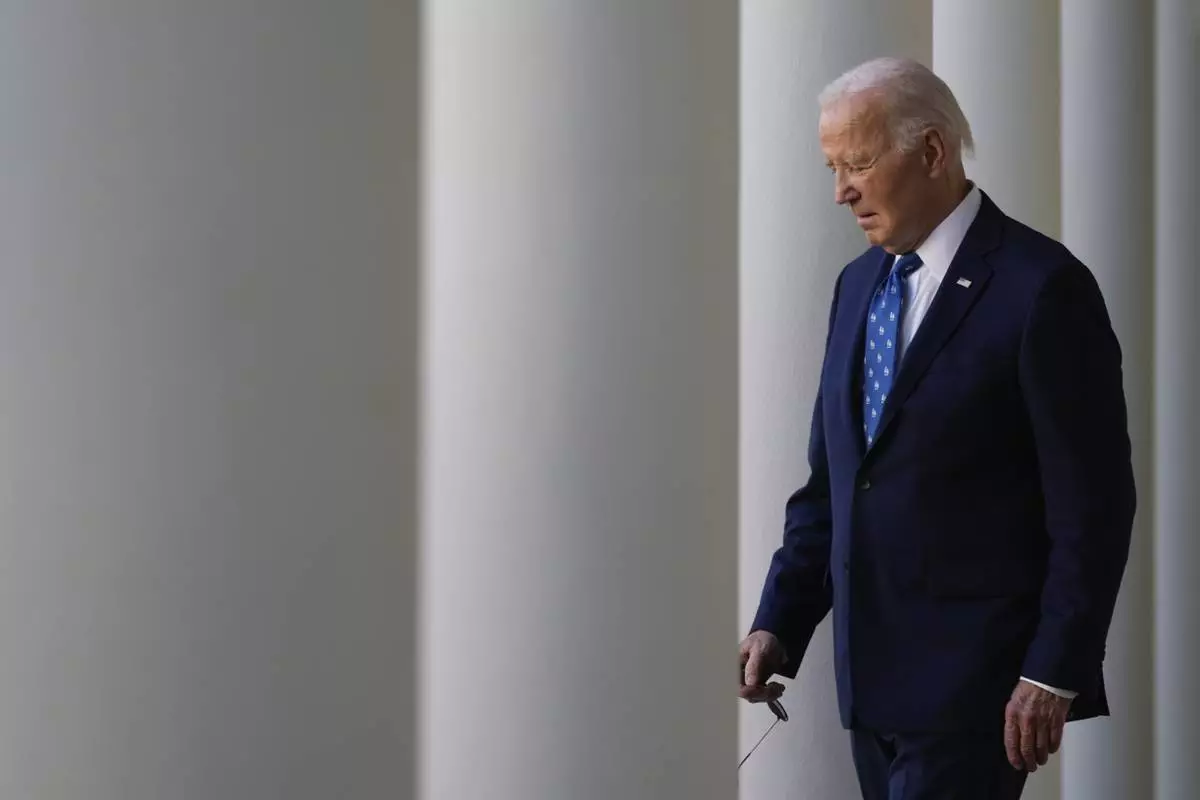
President Joe Biden walks out to speak in the Rose Garden of the White House in Washington Tuesday, Nov. 26, 2024. (AP Photo/Ben Curtis)
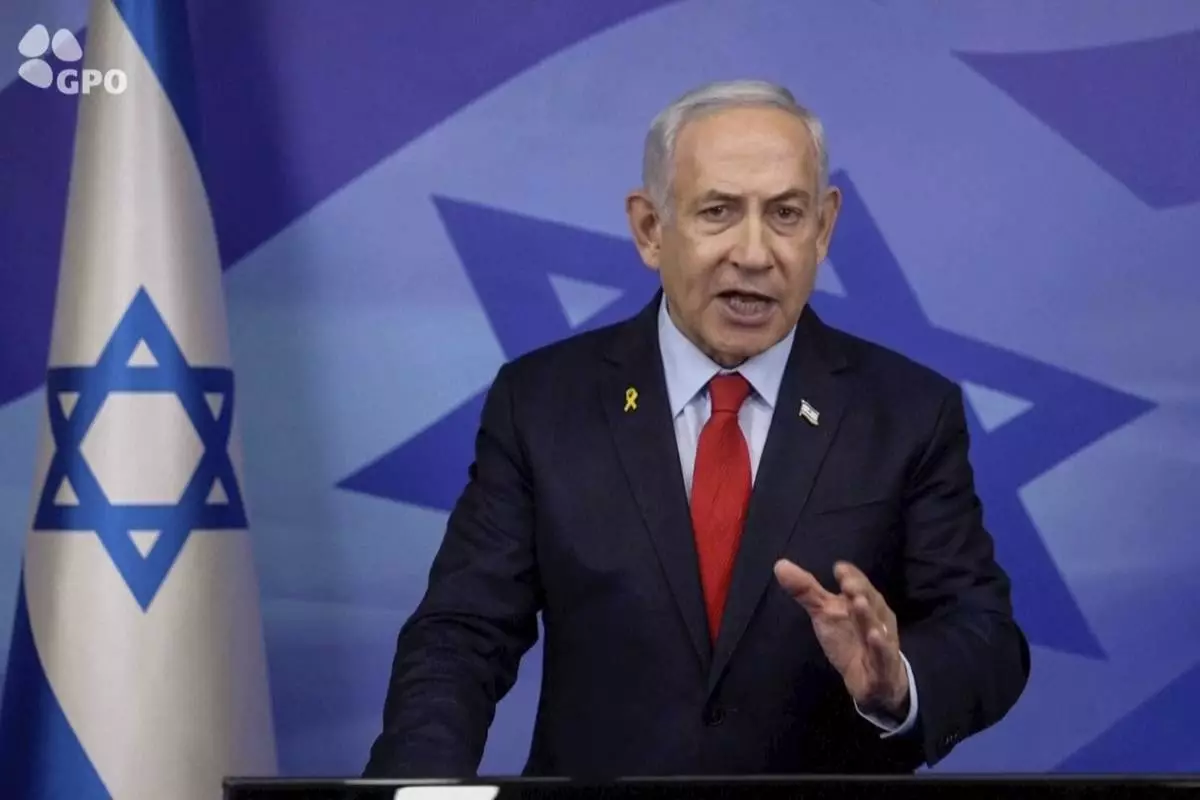
In this screen grab image from video provide by the Israeli Government Press Office, Israeli Prime Minister Benjamin Netanyahu makes a televised statement Tuesday, Nov. 26, 2024, in Jerusalem, Israel. (Israeli Government Press Office via AP)
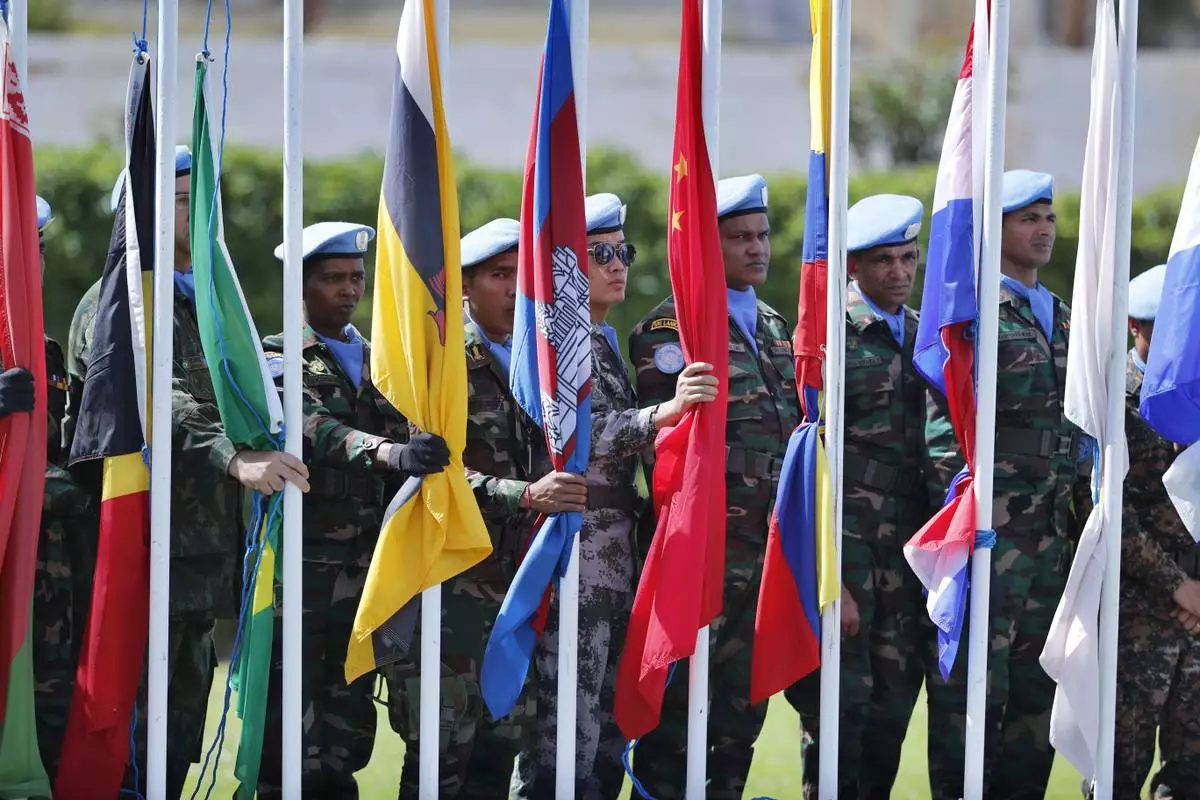
FILE - Peacekeepers representing 41 different national contingents that make up the United Nations Interim Force in Lebanon (UNIFIL), prepare to raise flags during a ceremony to mark the 40th anniversary of its peacekeeping presence in southern Lebanon, at the mission headquarters in the coastal town of Naqoura, Lebanon, Monday, March 19, 2018. (AP Photo/Hassan Ammar, File)
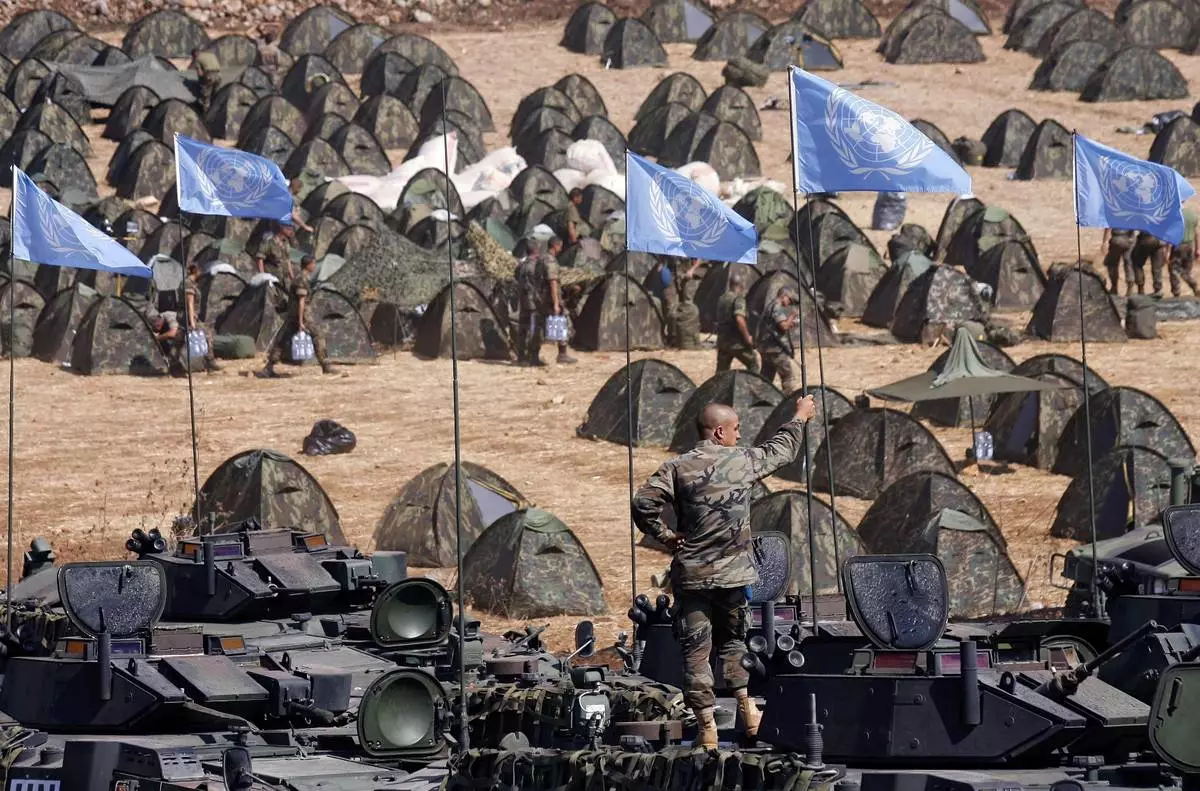
FILE - A Spanish U.N. peacekeeper stands atop an armored personnel carrier as U.N. flags are seen in the Spanish troops' new base in the southern village of Taibeh, Lebanon, Sunday, Sept. 17, 2006, as they joined the expansion of the UNIFIL peacekeeping force in Lebanon under a new Security Council resolution. (AP Photo/Alvaro Barrientos, File)
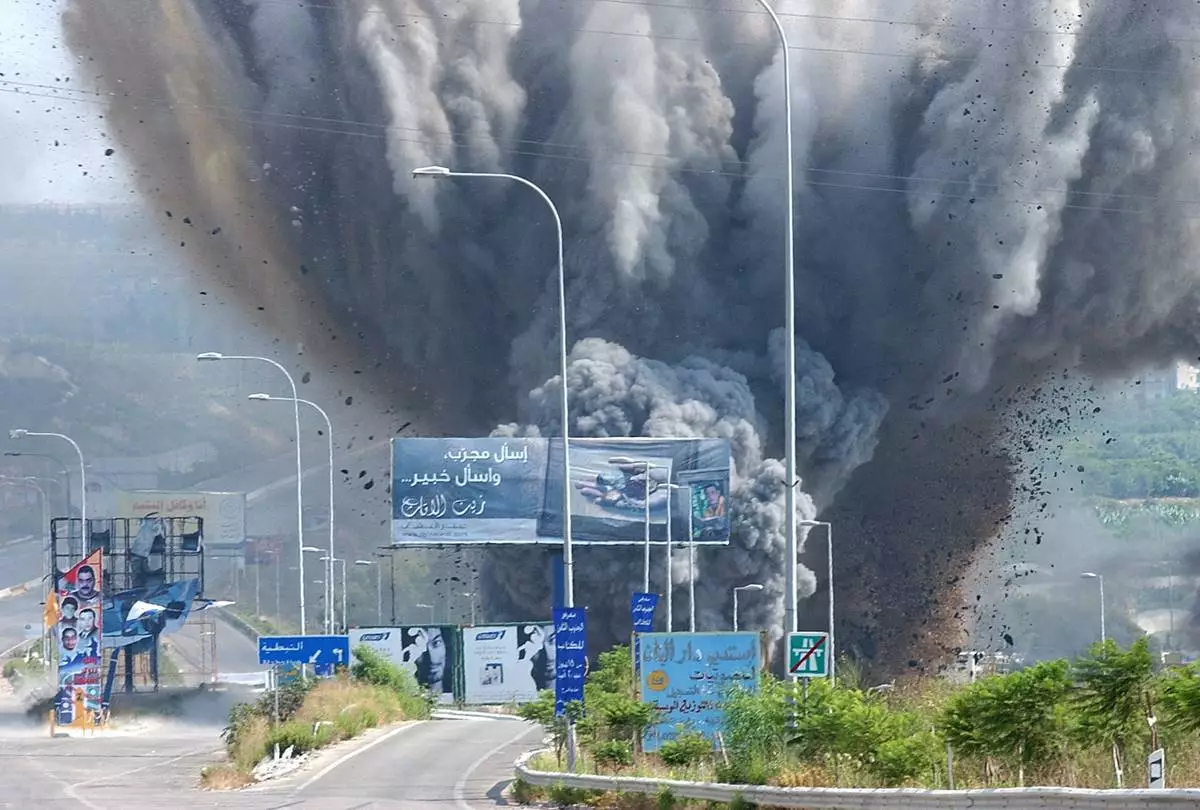
FILE - Smoke rises and debris flies from a bridge as it is targeted by an Israeli air raid, in the Zahrani region, on the Mediterranean coast, southern Lebanon, on July 14, 2006. (AP Photo/Mohammed Zaatari, File)
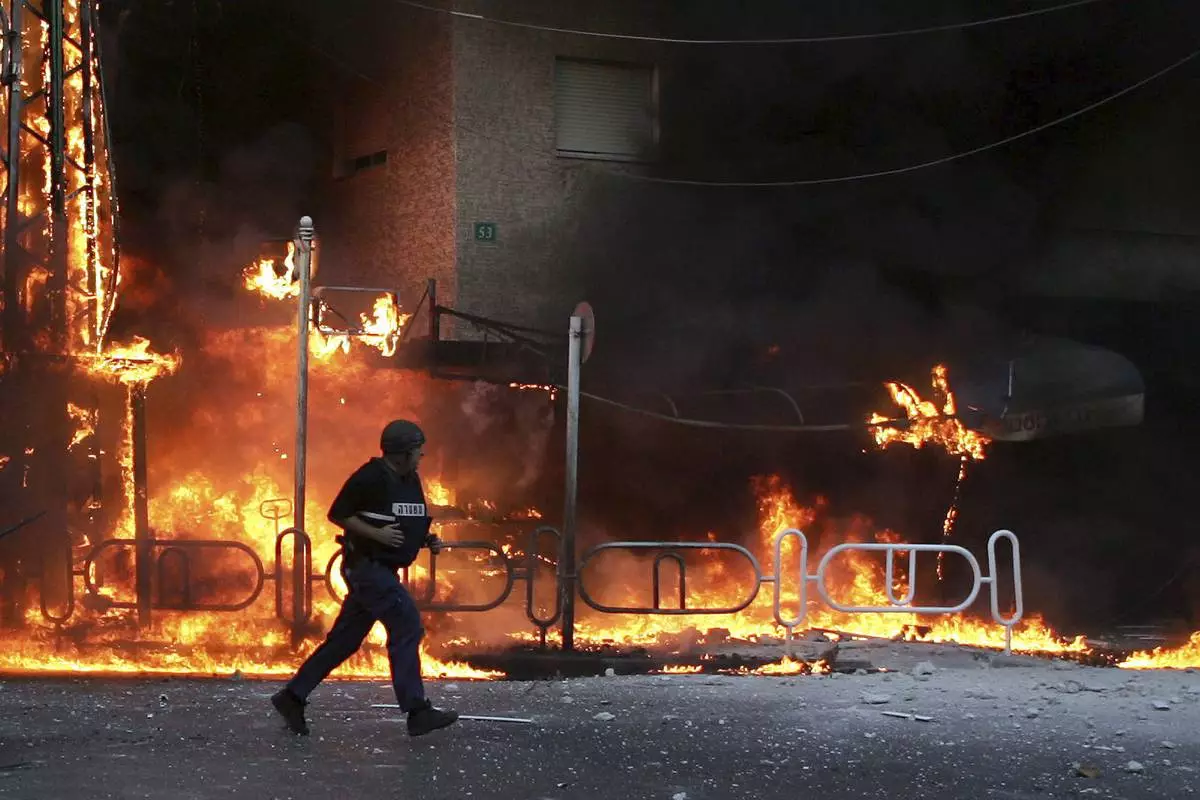
FILE - An Israeli police officer runs to the site where a Hezbollah-fired rocket directly hit a building in the northern costal town of Nahariya, on July 13, 2006. (AP Photo/Ariel Schalit, File)
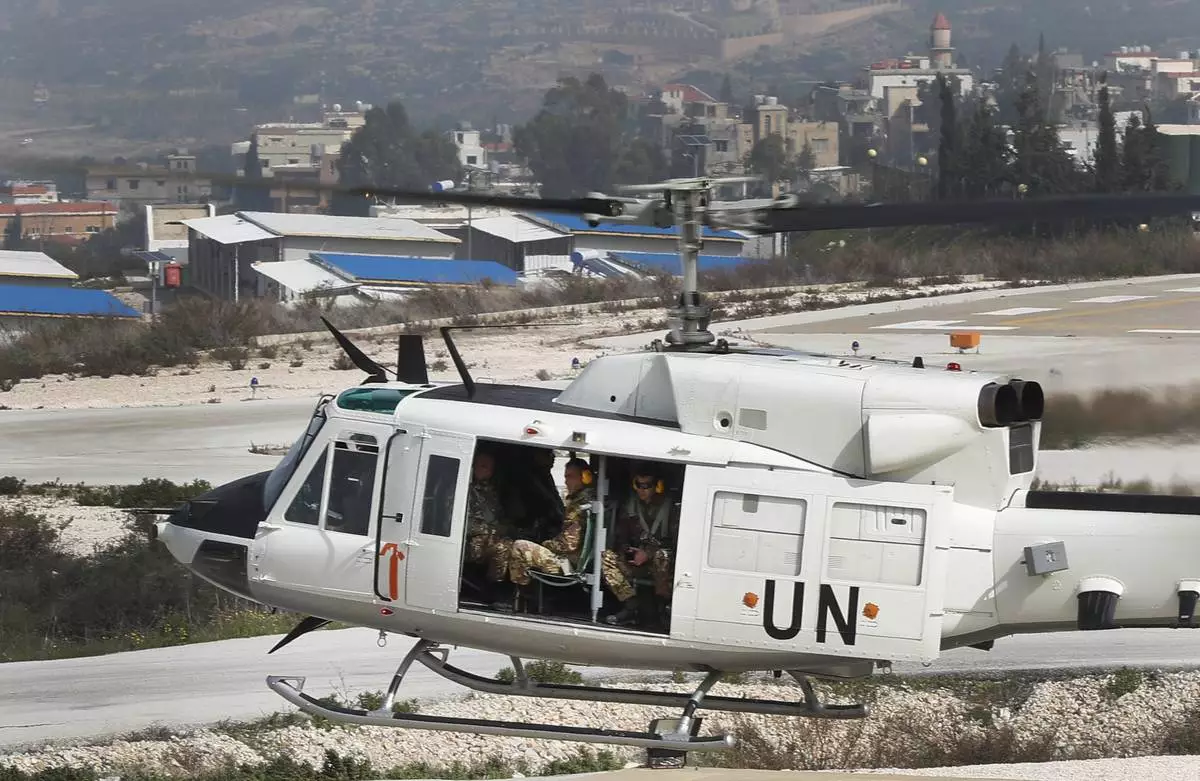
FILE - A United Nations helicopter carrying Italian peacekeepers takes off from the UNIFIL headquarters for a patrol over the Blue Line, a U.N.-drawn boundary between Lebanon and Israel, in the costal town of Naqoura, southern Lebanon, Wednesday, Feb. 7, 2018. (AP Photo/Hussein Malla, File)






















